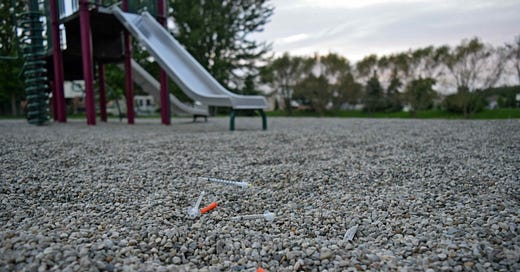Hello everyone!
We’re back again with more conversations from the UBCM 2023 front lines in Vancouver.
First up, the BC Government’s Sept. 18 announcement restricting public drug use within 15 metres of children’s play structures, splash parks and wading pools continues to create a stir.
Several UBCM resolutions yesterday went further than the province, asking for an expansion of mental health and addictions treatment, housing and the unproven experimental safer supply program, as well as an extension of the drug consumption ban to include all parks, beaches, sports fields and bus stops.
Perplexing measure falls short
For many, the provincial restrictions are a perplexing partial measure that don’t go far enough. “I'm sure every local government British Columbia would like to know how they came up with that,” said Steve Forseth, a Cariboo Chilcotin Regional District director, who added there's probably less than a dozen counties in BC that even have wading pools. As a mayor of a mid-sized rural community noted, 15 metres from a play structure doesn’t even cover the whole park in many cases.
.
“It doesn't address the problem that local governments are saying across the province is causing this issue,” said Forseth. “Again, it goes back to the provincial government needed to do that consultation piece with local governments first, before they went down this path of [decriminalizing] illicit drugs.”
Which leaves municipal governments to come up with their own individual solutions. “Talking to some my counselor colleagues, they've already said they're probably still going to go ahead with their bylaws to govern no illicit drugs in any of their parks,” Forseth said. “Because they said what came out is not going to move the needle about the real public safety issues that residents in the communities have.”
Most councils are either in the process of drafting their own bylaws restricting drug use, or they’re holding off until they see the scope of the legislation the BC government has promised to introduce in the fall. Others just want the province to provide municipalities with the tools so they can freely enact their own rules – which seems to be the province’s preferred path. Some municipalities didn’t wait and have already passed bylaws, including Nelson, Penticton, Kamloops, Port Coquitlam, and others. Sicamous was the first municipality in BC to pass a drug use bylaw.
A common thread
When asked about the most pressing issues in their communities, municipal leaders inevitably circle back to their struggle to pay for unglamorous but crucial infrastructure like roads, water treatment and sewers. That challenge is hardly new for mayors, but these days, councils are simultaneously shouldering complex public health and social disorder fallout from provincial (and federal) policies.
“Often property taxes don't give [municipalities] enough money to deal with the massive infrastructure deficits that we have,” said Courtenay Mayor Bob Wells. Part of the issue stems from a longstanding mentality of delaying public investments as long as possible to keep property taxes low. “The consequences is that we now have these massive infrastructure deficits.”
Delay now, pay later
A new water treatment plant had been under discussion for seven years by the time Wells was elected mayor in 2014. Then a flood precipitated a boil water notice for the community and the public health officer told council to build the plant. It still took the city nearly five more years before it was complete. In the meantime, project costs ballooned from an estimated $30 million to the final cost of $129 million in late 2018. Similarly, the $500,000 cost of remediating a bridge was delayed for a decade. “We saved tax dollars by not doing it. However, when we did do it, it was $6.9 million,” Wells said.
“Those same cost escalations, from my perspective, are exactly what we're seeing in housing. They’re exactly what we're seeing in mental health and addictions.” Which is why Wells is urging the province to invest in all three now.
Calculating the cost of not doing something
The costs of not investing in mental health and addictions carry additional burdens. The Regional District of Kitimat-Stikine wants a local detox facility in northwest BC and recently commissioned a feasibility study to determine not just the cost of having the facility, but also, the costs of not having it. “The personal cost, the human cost, is self-evident. But there hasn't been a quantified dollar value of say, this is the cost of the province’s inaction,” said Terrace councillor James Cordeiro, who also sits on the district board. The report will calculate a range of costs, including to the health care system, first responders, the BC ambulance service and more. “Then there's a rationale to pay that upfront cost to offset all those hidden costs.
“It feels bad,” he conceded, “because it feels like you're really putting a dollar figure on people. But that's the position we've been put in by not really having [gotten] any commitment to provide equitable and sustainable service.”
‘It's tearing our community to pieces’
In Smithers, the community is suffering deeply from a lack of those resources, said Mayor Gladys Atrill. “People see the news about the Downtown Eastside [In Vancouver]. it's the same where I live. It's just smaller and we have less ability to deal with it. It's tearing our community to pieces.” Like most other centres outside Victoria and the Lower Mainland, Smithers needs shelters, supportive housing, and mental health and addictions treatment. Even as the community grapples with how to help people move from severe addiction to a healthier place, Atrill has to also consider the needs of the people who keep the community healthy and functioning. “It's really hard, you know, to have people wondering, ‘Like, what happened here? Why don't I feel safe anymore?’ and I've heard people say, ‘Well, it's time to grow up, you have to lock everything up.’ But there's something a bit odd about saying, you have to lock your stuff up because we're just going to accept that people are taking it.”
One business owner has had all his windows broken by vandalism more than once. His insurance company won’t insure him anymore. Others have been assaulted or repeatedly robbed with seemingly no consequences to the offenders. People committing crime because of addictions don’t belong in jail, Atrill said. “However, people who are violent, people who are causing harm to others, not doing anything about that is unfair to the other people.”
She’s had business owners, lifelong residents, “people who deeply love where they live and have poured their heart and soul into the community” say they can’t invest in their businesses anymore and are thinking of leaving. “Because the trauma that they've experienced has changed how they feel about the community,” she said.
Atrill supports decriminalizing people for using drugs, but the province needs to deal with the impacts of that, she said. Programs like complex housing supports and addictions treatment are great and need to be shared with small towns before it’s too late. “We count on people loving their community and being committed to it in order to help us invest in it. It's that belief and love of community that energizes people. And when that's broken, we're in trouble.”
Reverse stigma
Decriminalization and harm reduction measures are intended to triage and save people and reduce stigma, but in Terrace it seems to be having an opposite, negative
effect because of the social impacts, said councillor Cordeiro. “I think people are willing to accept those negative impacts if there's a visible path for people to get better and to be able to take that next step.” But the northwest doesn’t have a treatment or detox facility. If people want to detox, they have to take a six-hour or more bus ride to Prince George. Many don’t make it. They get off the bus early and find themselves in a strange community and a worse situation. Or they don’t take the bus at all, Cordeiro said. Either way, the wider residents don’t see a pathway for people “to go from where they are, to getting well. And not having that path, I think, is resulting in greater stigmatization.”
Social costs hit hard
The social impacts of BC’s public drug polices came later to Houston, but the district really began feeling the pressures of public drug use and resultant social disorder after some people moved into a downtown park forming an encampment, said Mayor Shane Brienen. More individuals are scattered in the surrounding area. The community estimates it has incurred $100,000 in direct costs from provincial policies downloaded onto the community, including replacing damaged port-a-potties and repairing vandalized district buildings and other assets. “A lot of municipalities are scrambling to find those numbers, like, where are we at, what is this costing us and does that mean we're going to go without? Or can we get some help from the province?”
For small municipalities like Houston, the extra financial burden is a big hit, jeopardizing their ability to take care of other business that keeps communities rolling, including being proactive on initiatives that might benefit citizens as a whole. For instance, new resource development projects are good for local businesses and create jobs but they also stress the community’s infrastructure and services. “So you bring a lot of people in, they're using our roads, they’re using our health care, they're using a lot of our services.” But there’s no way to capture the economic benefits and apply them to offset the district’s costs. Which is why Houston, along with the other municipalities in the northwest are hopeful about negotiations with the province on a resource benefits revenue-sharing agreement for the region.

Fortunately, Houston has a strong economy, a skilled workforce and new investments on the horizon. Canfor’s decision to sink $200 million in a new mill will eventually return a portion of the jobs that disappeared with two huge mill closures in the last decade (including Brienen, who lost his job when Canfor closed its old mill this spring). As well, area mining projects are booming, providing about $4 million in salaries for local residents. “We’ve got a lot of good things happening,” Brienen said.
It’s just that even good news is rarely straightforward these days as municipal councils deal with complexities across the board. “They’re having long, hard discussions,” he said. “They're having trouble sleeping lots of nights. And weekends they’re up worrying about things. These are tough jobs right now.”
And in rural BC, they’re usually paid peanuts. But that’s a hill for another day.
Leaky pipes
If a community is really fortunate, it can get an infusion of cash from the province that saves the day. In Prince Rupert’s case, the local infrastructure was literally falling apart when the BC government stepped in with $65 million to replace the city’s water pipes. The pipes are so degraded, 40 per cent of the water that passes through them seeps through the pipe walls into the surrounding ground, Mayor Herb Pond said. Which has caused the community to delay construction of a new water treatment plant. No point treating water when almost half of it will drain into the earth.
Meanwhile, the province is also helping the city with its $82 million federal application. If successful, Rupert will be able to re-do about a third of its water mains.
“Our biggest single message right now to government is we're just saying thanks, we really are,” said Pond. “Thanks for taking our waterpipes situation really serious and responding in a very serious manner. And please keep helping us.”
That’s all for now. More UBCM political news tomorrow.
Thanks for reading!
Fran
Questions, comments or suggestions, contact Fran@NorthernBeat.ca
For brain calisthenics, read NorthernBeat.ca





